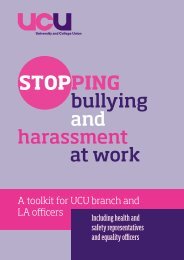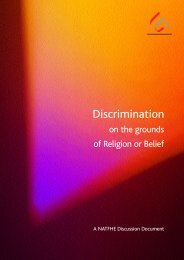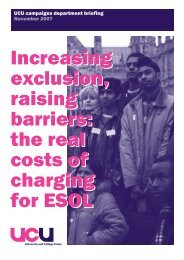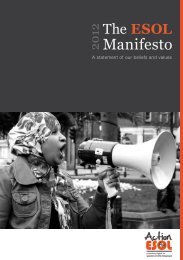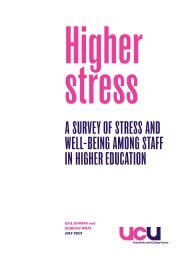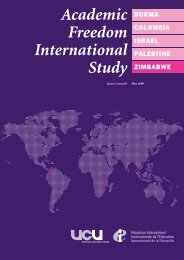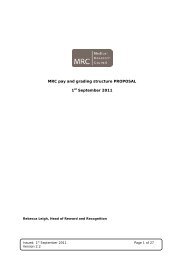GLOBALISATION AND HIGHER EDUCATION - UCU
GLOBALISATION AND HIGHER EDUCATION - UCU
GLOBALISATION AND HIGHER EDUCATION - UCU
Create successful ePaper yourself
Turn your PDF publications into a flip-book with our unique Google optimized e-Paper software.
Development Education Association29-31 Cowper StreetLondonEC2A 4ATTel: 020 7490 8108Fax: 020 7490 8123E-mail: devedassoc@gn.apc.orgWebsite: www.dea.org.uk (in development)Association of University TeachersEgmont House25-31 Tavistock PlaceLondonWC1H 9UTTel: 020 7670 9700Fax: 020 7670 9799E-mail: hq@aut.org.ukWebsite: www.aut.org.uk
<strong>GLOBALISATION</strong> <strong>AND</strong><strong>HIGHER</strong> <strong>EDUCATION</strong>Guidance on ethical issuesarising from internationalacademic activitiesProduced by:Association of University TeachersandDevelopment Education AssociationSeptember 1999ISBN: 0 900107 227
AUT prefaceDEA prefaceThis guidance, which has been produced inconjunction with the Development EducationAssociation, is designed to assist members who maybe involved in or are contemplating work abroad or incollaboration with colleagues or institutions in othercountries. Globalisation of world trade will increase theamount of international activity for universities.Equally, financial pressures on higher educationinstitutions lead them to see their international role asincreasingly entrepreneurial, contributing to nationalexport earnings. While this process may createopportunities for universities and individual academics,it may also give rise to ethical dilemmas whichpractising professionals need to address.These guidelines examine some of those dilemmas andsuggest how they can be tackled. We also intend touse the guide to persuade universities to adopt codesof social accountability and thus avoid such issueshaving to be resolved by individual members of staffwithout any institutional support. This guidanceencourages an approach to international academicactivity which promotes the contribution of highereducation to development and supports governmentpriorities of attacking poverty, illiteracy and disease.DAVID TRIESMANGeneral SecretaryHigher education has always operated within a globaland multi-cultural arena. But the environment haschanged dramatically over the past decade. We nowlive in the era of instant global communications. Manyhigher education institutions see themselves asinternational bodies. But what do we use as the basisfor our understanding of the wider world?The Development Education Association (DEA) is verypleased to be associated with this initiative because itis one of the first attempts to address the role ofacademics in this globalised educational arena.Development education as a term may not be wellknown in higher education, but its principles can beseen within many courses and activities. Central to ourperspective is that education which does not take intoaccount our global interdependence fails to givepeople a full understanding of whatever subject or skillthey are learning. We also start from a recognitionthat we need to understand the causes of injusticeand inequality in the world so that we can worktowards a universal goal of just and equitablesustainable development.For the DEA, this guidance is a contribution toencouraging academics to recognise these agendas intheir work. We are also pleased to acknowledge theencouragement and support of the Department forInternational Development (DFID) with this initiativeand welcome DFID’s increasing contribution topromoting a greater understanding of global anddevelopment issues.DOUGLAS BOURNDirector
Globalisation and higher educationGuidance on ethical issues arising from international academic activitiesCONTENTSexecutive summary page 41 introduction page 62 international partnerships and activities page 113 human rights page 164 sustainable development page 215 conclusion page 26bibliography and further reading page 27AcknowledgementThis document has been produced as a joint project between the Association of University Teachers (AUT)and the Development Education Association (DEA). The work benefited from the supervision of a jointworking party formed by representatives of both organisations. A large part of the credit for the documentmust go to Dr Aileen McKenzie, who acted as consultant to the project and undertook the extensiveresearch and much of the original drafting. Acknowledgement is also given to members of the AUTEuropean and International Affairs Committee, who reviewed the document, and also to members of AUT’s1999 Summer Council, who provided constructive comments that contributed to the finished publication.Any errors and omissions remain the responsibility of the AUT and the DEA.
1 INTRODUCTIONHigher education is now a major element on the international agenda. Reports from organisations such asUnited Nations Educational, Scientific & Cultural Organisation (UNESCO), the World Bank and theOrganisation for Economic Co-operation and Development (OECD) acknowledge the crucial role foreducation in economic development throughout the world. In these reports the roles for higher educationin economic development, the globalisation of the world economy, the development of a knowledge-basedsociety and the education and training of a skilled and flexible workforce are seen as crucial. Academic andacademic related staff in higher education are increasingly likely to become involved in a variety of ways ineducational activities with an international dimension whether as policy makers, advisors, members ofresearch or teaching groups or as individual practitioners.This increasing international participation has had the effect of both emphasising existing problems ofethical issues arising out of academic work and of raising new ones; there is growing concern expressed asmore examples of unethical behaviour are made public. Questions about how members of academic orrelated professions should behave in the context of international activities are being asked with increasingfrequency. This document is intended to identify some of the issues that might arise and to set them withinthe context of values shared by the Association of University Teachers (AUT) and the Development andEducation Association (DEA) in order to provide a framework within which practitioners can identify andaddress ethical questions arising out of their activities.Purpose of this bookletThere are seldom quick and straightforward answers to ethical dilemmas. This document cannot and doesnot attempt to address all the possible issues which may arise when university staff are contemplating orengaged in international work.In developing the document attention has been paid to roles university staff may be called upon to play ininternational academic activities; in particular, those arising from recruitment and teaching of and supportof overseas students and from collaboration with overseas institutions through franchising arrangementsand research which either draws on material from other countries and/or involves collaboration withcolleagues overseas. With these activities in mind, further consideration is then given to two areas where itis felt ethical issues are most likely to be presented in a university environment which is becomingincreasingly competitive and driven to secure ‘commercial’ income - human rights and environmentalsustainability. It is the premise of this document that principles underlining these two issues, while notuncontroversial, are nevertheless fundamental to a notion of academic professionalism and the idea of the‘role of service’ generally held by those concerned with the provision of higher education.Against this background the document sets out to:1. raise awareness of increasing potential for ethical dilemmas resulting from the increased role ofuniversities in a global market;2. provide both background information on areas of possible ethical concern and on sources ofinformation which can assist practitioners in determining their own ethical stance; and3. set an agenda for considered policy development for the AUT and universities to establish frameworks6 Globalisation and higher education
for resolving potential ethical concerns, which avoid such issues having to be resolved by individualmembers of staff without any institutional support.Background - perceptions of the role of higher educationPerceptions of the proper responses of higher education policy makers and practitioners to contemporaryinternational trends may be very different. Some commentators see higher education narrowly defined asserving largely economic goals:There is consistent evidence from multiple sources of a strong positive relationship between educationalattainment levels and output and productivity growth.Labour Market Policies: New Challenges - Lifelong Learning to Maintain Employability, OECD, 1996:8.Others regard it more broadly as part of a process of lifelong learning that both prepares citizens tocontribute economically to society and but also to contribute ethically, culturally, socially and politically:There is a need to rethink and broaden the notion of lifelong education. Not only must it adapt to changesin the nature of work but it also constitutes a continuous process of forming whole human beings - theirknowledge and aptitudes, as well as the critical faculty and ability to act. It should enable people to developawareness of themselves and their environment and encourage them to play their social role at work andin the community.Jacques Delors 1996, Learning: The Treasure Within, UNESCONarrow perceptions of the role of higher education can be counterposed to broader perceptions, asexemplified in the following table:Table 1: Perceptions of the role of higher educationHigher education – narrow perceptionsThe product: the specialised and knowledgeableindividual equipped to play an economic role insocietyThe task: production of a skilled workforce to attaineconomic goalsResearch: ‘cutting edge’ research to gain sectoral ornational competitive advantageThe knowledge society: higher education as anexportable commodity and a contributor towardeconomic goalsHigher education - broad perceptionsThe product: the reflective and adaptive teamplayer equipped to respond creatively to all formsof changeThe task: contributor to the lifelong development of‘responsible global citizens’Research: international collaboration in researchand information sharingThe knowledge society: higher education’s ‘role ofservice’ to society, multiple partnerships to facilitateknowledge distributionThe perceptions in the above table are not necessarily mutually exclusive; higher education is capable ofmeeting different expectations. This appears clearly in the Declaration adopted by the 1998 UNESCO (theUnited Nations Educational, Scientific and Cultural Organisation) World Conference on Higher Education.UNESCO’s 182 members adopted the Declaration on Higher Education for the 21st Century and anaccompanying framework for priority action. The Declaration and framework were the result of a five-dayinternational gathering which involved over 4,000 participants and included 114 ministers of education orGlobalisation and higher education 7
higher education. The main themes included proposals for increasing the accessibility of higher educationand suggestions for fostering international solidarity.While higher education’s economic function was appreciated, so too were its many other roles. The mainpoints of the Declaration have been summarised as follows:●●●●●●●●●●●Higher education should be accessible to all on meritA more student-orientated vision of higher educationCore missions are educating, training and undertaking research. Others include the promotion of national,regional, international and historic cultures, the enhancement of societal values and contributing to thedevelopment and improvement of education at all levels, including through teacher trainingEmphasis on higher education’s ethical role, autonomy, responsible and anticipatory functionAll engaged in higher education should defend and disseminate universally accepted values, among thempeace, justice, freedom, equality and solidarityEquity of access; promotion of the role of womenHigher education should reinforce its role of service to society, especially in assisting eliminating poverty,intolerance, violence, illiteracy, hunger, environmental degradation and diseaseReinforced links with the world of work with efforts devoted to developing students’ entrepreneurial skills sothat they become job creators as well as job seekersGreater diversity in organisation and recruitment methods and criteriaNational and institutional decision-makers should place students and their needs at the centre of theirconcernsGreater sharing of knowledge and expertise across national borders and the need to stem the brain drain,with priority given to training programmes in the developing countries, in centres of excellence formingregional and international networks, with short periods of specialised and intensive study abroad.David Jobbins, ‘Unesco takes “new way”’, in The Times Higher Education Supplement, Oct 16 1998The AUT and the DEA welcome this Declaration and share the values that it embraces. This document hasbeen produced to stimulate AUT members, their colleagues and higher education policy makers to considerthe contemporary international role of higher education and ethical problems that can arise from this role.While accepting that higher education is now a multi-million pound export earner, the AUT takes theposition that the sector’s mission as a provider of quality education, research and training must not becompromised. The global marketing of higher education means that academic staff may be called upon toweigh professional and ethical principles against financial imperatives. AUT recognises that there are no easyor universal answers, but it believes that members will find it timely to consider these issues and their ownpositions with respect to them.The DEA, as well as believing that wider world issues and perspectives should be an integral feature of alleducational activity, holds that a commitment to equity, social justice and sustainable development shouldunderpin all educational policies and initiatives.‘Development education is concerned with the quality of teaching and learning, the ethos of the learningenvironment and the democratic participation of learners and the learning process. Development educationplaces importance on problem posing as much as upon problem solving, on the application of interpretiveand resolutive skills as much as upon the acquisition of knowledge, on the local as much as upon the globaland on Northern as much as upon Southern development, arguing that the world is best viewed as aninteractive whole.’Higher Education in a Global Society - DEA Policy Statement (1998)Toward this end three themes are explored here, international partnerships and activities, human rights,8 Globalisation and higher education
and sustainable development. The AUT appreciates that many academics are eager to engage withsustainable development, to strengthen democratic institutions and practices and to contribute to a fairerdistribution of global rewards and resources. A substantial number are already engaged in what theUNESCO conference called higher education’s ‘role of service’ and they take such work very seriouslyindeed. Approaches to education, research and training that fail to reconcile the social and theenvironmental with the economic are increasingly seen as flawed. World Bank thinking is firmly disposed tothe view that improvement of the human condition and the preservation of the environment areinseparable from education and training for sustainable and democratic development:The Bank helps to facilitate learning and strengthen client country capacity through EDI’s activities (theEconomic Development Institute). As greater emphasis has been placed upon knowledge as a catalyst ofreform, EDI...has...launched and piloted core courses on development priorities from banking, finance andregulation to environment and sustainable development and from governance to human and socialdevelopment...‘Overview’, 1998 World Bank ReportAn integrative approach to local, national and international development needs to be given prominence inhigher education, not least because higher education has the capacity to make an important impact uponthese interlocking levels of global society:We share a global environment. We depend on each other for development and prosperity... We can nolonger separate what we want to achieve within our borders from what we face across our borders...If our finance, our trade, media, communications and even culture is, day by day, more transnational itwould be strange and politically dangerous if our politics remained locked in old compartments built justafter the Second World War. If the challenge is international then the response must be international too.We must launch a new era of international partnerships in which we modernise those institutions that allowus to co-operate and to work together.Tony Blair (1998:1) Speech at the 53rd UN General Assembly, New YorkIf higher education allows itself to be dominated by competition and financial interests, it runs the risk ofintellectual isolation. Knowledge may be generated but not distributed unless it is paid for. To reach theappropriate audiences academics need to incorporate professional, ethical and financial systems of qualityassurance in the planning, monitoring, evaluation and review of entrepreneurial activity.Taking things forwardThis guidance document aims to encourage AUT members, colleagues and higher education policy-makersto consider where tensions are likely to arise in the planning and implementation of their internationalactivities and also how they can be addressed. This does not have to be done in a bureaucratic way butthere is clearly a need for policy guidelines. The three main sections of the guidance give examples of theway that academics have approached or may have to approach different tensions and they refer the readerto salient questions and sources of information. Readers may use the document to assist in clarifyingpersonal values and/or for stimulating discussion and action with colleagues. The document is beingcirculated to vice-chancellors and principals and AUT local associations are encouraged to persuade them toadopt the approaches suggested here.The DEA has a strategy group looking at how global and development education perspectives can beGlobalisation and higher education 9
eflected within all aspects of higher education activity. This includes working with a range of nongovernmentalorganisations who are engaged in educational and awareness raising projects with studentsand academics, a joint initiative with Forum for the Future and organising a series of seminars withappropriate research centres on the impact of globalisation and international development on educationalprogrammes in the UK.Sources of support and guidanceThere are so many sources of support and guidance available that it would be a major enterprise to listthem all. However, members may find the following helpful.❐university charters and statutes❐terms of reference of university committees dealing with ethics and professional standards❐professional and ethical obligations (e.g. conditions for membership to professional bodies)❐contracts of employment, terms and conditions of service and other associated documents❐codes of practice on international collaboration and guidelines for working with overseas students (e.g.CVCP, HEQC, UKOSA, British Council)❐documentation from special interest organisations (e.g. Amnesty International, Council on EconomicPriorities, Educational International)❐national and international documents (e.g. the Foreign and Commonwealth Office, Department forInternational Development, Department for the Environment, Transport and Regions policies, papersand reports, relevant UN, UNESCO, UNED and ILO charters, declarations and conventions)10 Globalisation and higher education
2 INTERNATIONAL PARTNERSHIPS <strong>AND</strong> ACTIVITIESThe international marketing of higher educationThe Economic Impact of International Students in UK Higher Education (CVCP, 1995) notes that not only hasthe number of overseas students European Union (EU) and non-EU increased steadily since the 1970’s, butso too has income from fees and other forms of student expenditure, making higher education a significantearner in national and international terms. In 1973 there were 35,000 foreign students studying in the UK,a number which had almost trebled by 1992/93 to 95,000. Non-EU originated fees amounted to £310million in 1992/93 and both EU and non-EU students spent a further £415 million on British goods andservices in the same year. This, in total, was more than double the export value of coal, gas and electricityin 1992/93.In the early 1990’s pre-1992 universities relied, on average, upon 5.1% of recurrent income coming fromnon-EU nationals, while ‘new’ universities depended, on average, upon non-EU nationals for 2.2% ofrecurrent income. However, there were extreme examples at either end of the spectrum, with the LondonBusiness School deriving some 23.9% of recurrent income from non-EU nationals, and the Universities ofBournemouth and Northumbria appearing to derive no such income at all.The Committee of Vice-chancellors and Principals’ (CVCP) report also points out that long-term economicbenefits should also be considered. UK educated overseas students are not only likely to make futurepurchases of UK goods and services when they return home but also commend UK higher education andspecifically their alma mater to prospective students. The contribution of higher education thus starts tobecome part of a very big picture indeed. Even in global terms the picture is not inconsiderable, with theUK’s 17% of the total pool of enrolled overseas students coming second only to the USA’s 70%.The CVCP report ranks the top 34 ‘suppliers of overseas students to the UK’ and the top 34 ‘UK exportmarkets for merchandise’ on the same table. Twenty-five countries are common to the two columnssuggesting that time spent studying in the UK helps generate ‘a stock of goodwill towards UK plc’. It wouldbe reasonable to expect that sales of UK ‘intellectual merchandise’ (such as publications, courses and knowhow)will be assisted by this same stock of goodwill. The CVCP notes that UK higher education hassuccessfully practised ‘product and market diversification’ via new approaches, including distance learningpackages, franchising, twinning and new courses. UK higher education systems appear to have been adeptat interpreting and responding to the social, political and economic factors that drive overseas demand. Anobvious example of response to market demand is that as governments and individuals have found itincreasingly difficult to finance long periods of study away from their own country, universities have comeup with an array of cost-reducing or cost-spreading approaches:●●●●●●modularised courses which can be taken full and/or part-time and paid for in instalmentscountry of domicile-based learning - courses delivered by distance methodscountry of domicile-based and/or UK-based learning - mixed-mode courses delivered by distance andtaught methodscountry of domicile-based and UK-based learning - split site taught coursescountry of domicile-based UK - franchised coursescountry of domicile-based UK courses adapted and taught by overseas academics - localised coursesThe Higher Education Statistics Agency (HESA) monitors students’ choice of courses by qualification aim,fee-paying status, domicile, age group, subject areas, locality of institution and by gender. UK higherGlobalisation and higher education 11
education institutions also gather their own data through course monitoring, contact with funders andoverseas universities and focused market research. Capacity to produce ‘intellectual merchandise’ whichsatisfies market demand is better today than its ever been.Supporting overseas studentsWhile few, if any, universities are able to ignore the economic ‘bottom line’, most appreciate that in parallelto generating income they need to play a broad ‘role of service’ to overseas students. Some go toextraordinary lengths to welcome, support and address the needs of such students. A number of bodiesproduce guidelines and codes of practice pertaining to the recruitment and support of overseas students(British Council, 1995; CVCP, 1995; UKCOSA, 1998-99). There are also websites and helplines for furtherinformation which students can tap into. The CVCP code of practice is very comprehensive and describesgood practice in information provision, marketing and recruitment, admissions, academic matters, supportservices, student feedback and code of practice monitoring. The information section for example covers●●●●●●●●●●●●●the quality and clarity of up-to-date institutional literaturethe availability of information at pre-application and arrival stagesthe comprehensiveness of literature: courses offered and qualifications needed; academic requirementsand English language proficiencydetails of tuition feesinstitutional requirements concerning payment of fees and chargesaccommodation on and off campusacademic and non-academic support services relevant to overseas students’ needsinstitutional policies on equal opportunitiessources of financial assistanceinstitutional services available during vocational periodsgeneral guidance on such areas as UK immigration and entry regulations, employment, health provisionand insurance, emergency services and drugs legislationadvice on UK culture including social conventions, general aspects of everyday life and living costsreferences to external sources of guidance and advice, including UKCOSA (the Council for InternationalEducation) and British Council literatureCVCP (1995), Recruitment and Support of International Students in UK Higher Education InstitutionsYet because different people are charged with recruiting, welcoming, orientating and supporting overseasstudents academically and pastorally, there can be weaknesses in the university good practice chain.Students need time and opportunity to pursue proper enquiries at overseas recruitment fairs and will find ithelpful to talk to academic as well as international office staff on such occasions. Delegates attending suchfairs need to be aware of admissions procedures and course-entry requirements so that prospectivestudents are not given false hopes, or worse, actually promised admittance on the spot. Administrative,ancillary, library and academic staff who come into contact with overseas students need to be sensitised tocultural differences and enabled to deal with overseas students in an appropriate way. All university staffneed to be appraised of the content and process of overseas-student induction programmes in order toensure they are fully supported. Finally, overseas students often value contact with the wider society; oneway of initiating this can be via placement schemes. Such schemes work best where they coincide with thestudent needs and interests while enabling the student and the placement body to capitalise on eachother’s skills and experience.Once settled in to their UK universities and having access to necessary support facilities, overseas students12 Globalisation and higher education
may be regarded as valuable contributors to the educational and cultural experiences provided by theirinstitutions. The diverse cultural and life experiences of overseas students can help place issues in a broadercontext. Despite the range of cultural societies provided through many student unions, integration intomainstream university academic and social life is not easy for some overseas students. In the academiccontext Edward Said has commented:Without significant exception the universalising discourses of modern Europe and the United States assumethe silence, willing or otherwise, of the non-European world. There is incorporation; there is inclusion; thereis direct rule; there is coercion. But there is only infrequently an acknowledgement that the colonised peopleshould be heard from, their ideas known.(Cited by Jagdish Gundara, ‘Intercultural issues and doctoral studies’. 1997)All staff and students should accept the responsibility to ensure that overseas students are sufficiently atease in their new environment in order to contribute themselves to the university experience of bothstudents and staff. This is something which can be specifically taken into account as part of staffdevelopment programmes. The increased breadth of critical vision derived from overseas students shouldbe regarded as an educational asset of a university to be welcomed and encouraged.Higher education partnershipsThe Higher Education Quality Council (HEQC, now Quality Assurance Agency for Higher Education)produced a Code of Practice for Overseas Collaborative Provision in Higher Education (1995). This Code notesthat international collaboration policy should clearly specifythe relationship between the policy and the institution’s mission, should state the university’s requirementsin respect of the comparability of the quality and standards of programmes provided overseas, and shouldlist the benefits which are expected to accrue to the institution and its partners as a result of the links.Potential overseas partner institutions may have a variety of intentions and motives in wishing to establishcollaborative links. The UK partner should make extensive enquiries to satisfy itself that these intentions andmotives are fully compatible with its own, and will not require it to compromise its own quality andacademic standards.The Code covers matters such as responsibility for quality and standards, the selection of partners, financialarrangements, the use of agents, quality control, and the language of instruction.Although such codes tend to emphasise course delivery arrangements, they can serve as ‘good practice’checklists for academics involved in other forms of international relationship. However, we need torecognise that different relationships require different levels of ethical and organisational response. Some,like internet fora, are informal and are likely to carry few implications; others demand formal arrangementsfrom the outset. Those that grow from modest beginnings into complex programmes require constantmonitoring and revision. North - South academic collaboration always requires special scrutiny, not leastbecause the Northern half of the partnership tends not only to have the greater power and resources but isalso able to exercise such strength, even unwittingly, to its own advantage. What constitutes ‘mutualbenefit’ to each party needs to be made clear very early on. The need for genuine co-operation ‘based onsolidarity and partnership, as a means of bridging the gap between rich and poor countries’ is recognisedin the UNESCO Declaration (1998:20); this suggests that ‘each institution of higher education shouldenvisage the creation of an appropriate structure and/or mechanism for promoting and managinginternational co-operation’.Globalisation and higher education 13
Case studiesThe use of educational agents as brokers or facilitators of educational links with overseas partners needs tobe treated with caution. HEQC makes a number of points:●Educational agencies are commercial ventures whose interests cannot necessarily be assumed to be thesame as those of their UK clients.●While much of the value of agents lies in their specialist knowledge of the local higher education scene,this knowledge may on occasions be used partially and to the disadvantage of UK institutions.(1995: 9)The first of the cases below indicates the sort of difficulties that can arise with overseas franchises. Thesecond demonstrates how dilemmas can be effectively addressed even where there may be a degree ofrisk.CASE 1A university establishes a franchise arrangement with a private overseas teaching institution. The franchisearrangement states clearly the standards to be met, the syllabus of each course and the control by theuniversity over marking practices and standards. Teaching is by a mixture of secondment of staff andoutreach teaching/distance teaching by the franchising university and by locally recruited staff.There is an assumption by students enrolling at the franchised college that because they are paying for thecourse, they will automatically qualify. As a result, pressure from students, parents, the franchisee or thefranchising institution may be brought on teaching staff to adjust marking standards so that everyonepasses the examinations and assessments.This scenario raises several problems relating to the nature of the enforceability of the contract betweenthe two institutions, the fundamentally commercial nature of the relationship with consequent possibilitiesof compromise, the local expectations of proprietors, local staff and students, a private education systemas the only access to higher education for some students and the acceptability of the recruitment policiesadopted locally for both staff and students.Issues for franchising institutions can arise from their ability and willingness to monitor the activities of theinstitutions to which they franchise. Issues for academic and related staff relate to the extent to which theyare personally and professionally vulnerable in situations such as these.There are quality implications for the university and the support it gives to its staff in a potentiallycompromised position and there are issues for individual staff in terms of contractual obligations,managerial instructions and behaviour and the maintenance of professional integrity.CASE 2An example of one UK university’s relationship with an overseas agent involved the agent approaching oneof the university’s departments to run one of its courses at a far eastern university. The agent was mostinsistent that the course should remain under the control of the UK university and that he should act asintermediary. However, when one of the staff from the UK department visited the far eastern university to14 Globalisation and higher education
discuss delivery arrangements, the academic saw that the course would only partially meet the proposedstudents’ needs. This led the lecturer to suggest that the overseas institution should take out a franchiseon the course, validate it and adapt it to meet the needs of the students. He and his colleagues would assistin the process and help train their overseas partners to run the course as part of the franchising agreement.The agent was disgruntled by this because it meant that he would make less money on recruiting studentsto a locally priced (and seemingly less-prestigious) course, but both the overseas university and thestudents were better served.Research relationshipsInternational relationships in research must also be considered. Gibbons (1998) argues that if universitiesare to keep up with the knowledge production system they also need to participate in the knowledgedistribution system. ‘Universities of the 21st century will develop many more and different kinds of linkswith surrounding society. Perhaps one day they will be ranked in terms of their “connectivity” to thedistributed knowledge production system’, he says. Apart from making professional and commercial senseto be at the forefront of research and development in a particular field, there are equally valid ethicalreasons as to why universities should be ‘connective’. As Lionel Jospin told the 1998 UNESCO gathering,‘higher education must adapt to the market but not be governed by it’. By maintaining a criticalindependence from the market, research carried out by higher education institutions preserves not only itsvalue but also its unique capacity to contribute to the improvement of the human condition.Pressure on UK academics to ‘produce’ research for research assessment purposes and generally to attractfunding has created an increasingly instrumental approach to research activity. The practice of researchoften requires data collection, observation and sampling from other countries, including those in the lessdeveloped world. Such activity should be regarded as more than an extension of a research function basedin the UK matters such as relationships with local higher education institutions and cultural andenvironmental impact need to be considered. The UNESCO Declaration urges higher education institutionsto:...use their autonomy and high academic standards to contribute to the sustainable development of societyand to the resolution of the issues facing the society of the future...(1998:17)and to...take all necessary measures to reinforce their service to the community, especially their activitiesaimed at eliminating poverty, intolerance, violence, illiteracy...(1998:18)Academic research should not be regarded as being at an end with the publication of an article. Anylessons from a piece of research which can be of service to the community, should be clearly identified andbrought to the attention of interests who are in a position to act upon them.Globalisation and higher education 15
3 HUMAN RIGHTSExpanding conceptions of rightsThe Universal Declaration of Human Rights is as significant today as it was in 1948 when it was drawn upand ratified by the United Nation’s then 58 country members. As UN membership has grown to its present185 member states, increasing numbers of the world’s people have turned to the Declaration to legitimateclaims to rights and protest infringements of liberties. This has set in train a process which has enabled usto deepen our understanding of the social, political, economic and cultural interdependence of the natureof human rights and freedoms. The early civil and political emphasis of the Declaration has been expandedto give greater prominence to ‘second generation’ rights, such as social and cultural rights, which havebeen augmented over the past decade by ‘third generation’ rights such as the right to development, toself-determination and to a sustainable environment. Our conception of entitlement to rights hasexpanded, as has our capacity to perceive how the rights of particular groups (such as children, women,religious and racial minorities and indigenous peoples) require special attention.[The leaders of the world] affirmed rights were universal for all peoples regardless of race, religion or country.They had no time for the notion that human rights are subject to any kind of cultural relativism and norshould we fifty years later.Those fifty years have also left threadbare the excuse that human rights are a luxury which cannot beafforded by countries that are poor. Human rights are indeed of little value without freedom from hunger,from want and from disease. And economic and social rights are as important as civil and political rights.But the past two decades have repeatedly demonstrated that political freedom and economic developmentare not in conflict, but are mutually reinforcing.Countries with the strongest authoritarian rule are more often than not countries whose economies havestagnated as backwaters in a global economy that has passed them by. Conversely, the World Bank hasconcluded that the economies with the faster growth were those where political equality has produced thefairest shares of income.Robin Cook (1998:1), Speech at the Amnesty International Human Rights Festival, LondonRights fundamental to academic freedomIt could be argued that all rights are fundamental to academic freedom, but this is too broad to providethe practising academic with an adequate reflective focus. The Universal Declaration of Human Rightscontains a number of Articles that academics are likely to find particularly relevant:Article 18Article 19Article 20 (1)Article 23 (4)Article 26 (1)Article 26 (2)Everyone has the right to freedom of thought, conscience and religionEveryone has the right to freedom of freedom of opinion and expressionEveryone has the right to freedom of peaceful assembly and associationEveryone has the right to form and to join trade unions for the protection of (her) hisinterestsEveryone has the right to education...higher education shall be equally accessible to all onthe basis of meritEducation shall be directed to the full development of the human personality and to the16 Globalisation and higher education
Article 27 (1)strengthening of respect for human rights and fundamental freedomsEveryone has the right freely to participate in the cultural life of the community, to enjoythe arts and to share in scientific advancement and its benefitsIn addition to the Universal Declaration there are a number of specialist human rights conventions.Academics who work with children, young people and families should refer to the UN Convention on theRights of the Child (1989). Academics concerned with trade union activities, labour studies and indigenousand tribal peoples should refer to the relevant Internatoinal Labour Office (ILO) Conventions.Knowing which countries have signed up to particular conventions can be as important as knowing whatconventions exist. Amnesty International Reports provide a detailed picture of the ratification and accessionprocess of many UN and ILO conventions (and list Amnesty offices and actions worldwide), but thefollowing summary gives us a helpful overview of the process.Table 2: Ratification of major human rights conventions, March 1 1997ConventionPrevention of punishment and genocide, 1948Convention on the status of refugees, 1951Economic, social and cultural rights, 1966Civil and political rights, 1966Elimination of discrimination against women, 1979Convention against torture, 1984Rights of the child, 1989Countries that haveratified or acceded120125135136153102190Countries that havenot ratified or acceded7267575639902The United States has not ratified the conventions on the rights of the child, the elimination of discriminationagainst women and economic, social and cultural rights. Switzerland and Afghanistan have not acceded tothe convention on women. Just over half of the UN’s members have signed up to the convention againsttorture and other cruel, inhuman or degrading punishment, although Indonesia, Nicaragua, Nigeria, SierraLeone and Belgium are among the objectors. Source: The New Internationalist, 1998Marketisation and integrityWe inhabit a society and a world where human rights and freedoms are seldom vigorously and coherentlyupheld. Whether as actors in the UK higher education system or as members of international academicventures we find that we are increasingly confronted by difficult ethical decisions. The marketisation of theUK higher education system, with its attendant pressures of exporting courses and intellectual products toother parts of the world, of winning overseas students from competitor universities, and of securinglucrative research contracts from foreign governments and the commercial world, makes academics’ rolesand responsibilities ever more complex. What follows is based upon the premise that it is better toanticipate and prepare for ethical dilemmas than to respond in a piecemeal way when the storm cloudsbreak. The remainder of the human rights section of this document can be used for personal reflection,though it has to be said that individual members of staff are likely to feel vulnerable if they do not have theshelter of a wider policy umbrella.Globalisation and higher education 17
While acknowledging that there are no easy answers to ethical dilemmas, there are various initiatives thathelp show how human rights dilemmas can be addressed at an institution-wide level. The AmnestyInternational UK Business Group (1998) has produced a ‘checklist of human rights principles’. If the word‘universities’ is substituted for the word ‘companies’, the checklist enables consideration of whereuniversities could adopt policy and practice:1. [University] policy on human rightsAll [universities] should adopt an explicit [university] policy on human rights which includes support forthe Universal Declaration of Human Rights...2. SecurityAll [universities] should ensure that any security arrangements protect human rights and are consistentwith international standards for law enforcement...3. Community engagementAll [universities] should take reasonable steps to ensure that their operations do not have negative impacton the enjoyment of human rights by the communities in which they operate...4. Freedom from discriminationAll [universities] should ensure that their policies and practices prevent discrimination based on ethnicorigin, gender, sexuality, colour, language, national or social origin, economic status, religion, political orother conscientiously held beliefs...5. Freedom from slaveryAll [universities] should ensure that their policies and practices prohibit the use of chattel slaves, forcedlabour, bonded child labourers or coerced prison labour...6. Health and safetyAll [universities] should ensure that their policies and practices provide for safe and healthy workingconditions and products...The Council on Economic Priorities (CEP) has produced an international standard for social accountabilitybased upon International Labour Office (ILO) Conventions, the CEPAA SA 8000:1997. While described as ‘auniform, auditable standard for a third party verification system’ and directed at the corporate world, it canequally be adopted by universities that wish to make their position on social accountability known. The CEPruns a Forum on Global Standards, which is open to universities and offers regular training sessions onethical auditing. SA 8000 deals with the following ‘social accountability arrangements’:1. Child labour2. Forced labour3. Health and safety4. Freedom of association and right to collective bargaining5. Discrimination6. Disciplinary practices7. Working hours8. Compensation9. Management systems: policy; management review; company representatives; planning andimplementation; addressing concerns and taking correction action; outside communication; access for(third party) verification; records18 Globalisation and higher education
Human rights - some questions for academics to askThere is no neat and tidy ethical checklist which can be applied to all situations at all times. Whileinstitutional and departmental policies may be relatively clear-cut, the choices that an individual feelscompelled to make may not always be quite so straightforward, yet individuals need not feel that they areentering uncharted territory. There are sources of support and guidance available and the more widely oneconsults before making an ethical choice, the more comfortable one is likely to feel with the decision. Themain question that needs to be asked is ‘what is likely to be the impact of my decision?’ Supplementaryquestions may be posed and are likely to include:❐Should I work in, or would my activity condone, a system where freedom of thought, conscience,opinion, assembly and association including membership of independent trade unions, is notpermitted?❐Should I work in, with or for a system where all are not equal before the law?❐Should I work in, with or for a system where either my colleagues or I might be subject to arbitraryarrest, detention or exile?❐Should I work in, with or for a system where citizens are subjected to torture or other cruel, inhumaneand degrading punishment?❐Should I work in, with or for a system where education is not available to all?Different academics will come up with different responses to such questions. Much will depend uponcontext-specific factors. For example, one academic may answer ‘yes’ to the final question because theybelieve that they can assist in universalising education, while another may answer ‘no’ because they believethat they will be serving an educational élite and helping to maintain social inequality. On the other hand,there will be those academics whose business it is to research into and teach about oppressive regimes andwho would find it very difficult to have no contact with such societies. At the end of the day it is importantto be very clear about one’s own professional values and the way they articulate with broader policy andlegislative arenas.20 Globalisation and higher education
4 SUSTAINABLE DEVELOPMENTThe ‘marketing’of higher education can mean either selling goods and services that simply conform toexisting social and environmental practices or ones that involve original thought, innovation, newperspectives, new approaches to managing change and new models of social, political, economic, scientificand cultural organisation.If higher education is to be part of social progress, then it cannot avoid having to grapple with sustainabledevelopment; those who are being educated will have to deal with social and environmental legacies leftby the current generation and will, in turn, create social and environmental legacies for the future.Academics’ ‘role of service’UNESCO’s emphasis on the academic community’s ‘role of service’ was noted earlier in this document.Agenda 21, the Rio Earth Summit’s Agenda for Change which was endorsed by 179 member states in June1992, points to ways that the academic community can play such a role:A country’s ability to develop in a more sustainable way depends on the capacity of its people andinstitutions to understand complex environment and development issues so that they can make the rightdevelopment choices.People need to have the expertise to understand the potential and the limits of the environment. They willface difficult policy choices when dealing with such complex problems as global climate change andprotecting biodiversity. This will require scientific, technological, organisational, institutional and other skills.Michael Keating (1993:58), The Earth Summit’s Agenda for Change, Centre for Our Common FutureIt would be difficult to imagine how capacity could be created or skills, knowledge and technical know-howbe transferred to developing areas of the world, if the academic community does not play its part in thesetasks. The importance of education, training and public information is endorsed throughout Agenda 21,including its 2 UN conventions on climate and biodiversity. Chapters 31 and 36 are particularly significantfor academics. Chapter 31 focuses on ‘Scientists and technologists’ to suggest that governments should:●Decide how national scientific and technological programmes could help development to become moresustainable.●Provide for full and open sharing of information among scientists and decision makers...And might find it a good idea to:●[Form] national advisory groups to help scientists and society develop common values on environmental anddevelopmental ethics.●[Put] environmental and development ethics into education and research priorities.Chapter 36 deals with ‘Education, training and public awareness’ and advocates that environmental andGlobalisation and higher education 21
development issues should crosscut all levels of the system over the next three years (1992-95). Morespecifically, countries should:●Set up training programmes for school and university graduates to help them achieve sustainable livelihoods.●Encourage all sectors of society, including industry, universities, governments, non-government organisationsand community organisations, to train people in environmental management.Sustainable development and social justiceAs might be expected from a programme of this scale, progress has been patchy. Although Jonathan Porritthas pointed out that though the Earth Summit can be regarded as being ‘just another UN talk shop’, asubstantial number of international, national and local achievements have come about as a result of Rio.Porritt acknowledges that while the slowness of progress in relation to the urgency of the task createsfrustration, an equally important tension stems from sustainable development and social justice not beinggiven equal attention to specific environmental goals such as global warming and biodiversity;So it’s worth remembering...that there was undoubtedly a ‘deal’ on the table at the Earth Summit. G77and emerging countries implicitly agreed to sign up to action plans for addressing some of the bigenvironmental issues (global warming, deforestation, loss of biodiversity etc.) whilst oecd countries implicitlysigned up to the idea of increased aid flows and other forms of development assistance as the quid pro quofor their buy-in to the environment agenda...But the deal couldn’t quite be made to stick even at the time. At the behest of the United States and theUK, the crucial concept of over-consumption in northern industrialized countries was entirely excised fromthe conference documentation and discussed only on the fringes.J Porritt from Dodds, F (ed), The Way Forward: Beyond Agenda 21, London: Earthscan (1997)While this interpretation of events may or may not be accurate, the underlying issue to note is that the vastmajority of Earth Summit outcomes have been orchestrated from a Northern environmental position ratherthan a global vantage point. In consequence, sustainable development as an integrative goal in whichsocial and environmental tensions are addressed and reconciled in North-South terms, seems to havedisappeared from the discussions. As long as social justice is rendered invisible in sustainability discourse,analyses and solutions can only be partial. If the general public remain hazy about how the North impactsupon the South, there will be no incentive to produce any change. Universities have a particularlyimportant ‘role of service’ to play in giving prominence to social justice issues in sustainability debates.Higher education and the sustainable societyThe World Commission on Environment and Development (WCED: 1987) stressed sustainable development,as linking present actions to the future, defining it as,development that meets the needs of the present without compromising the ability of future generations tomeet their own needs.Since WCED, thinking has moved on apace. Caring for the Earth: A strategy for sustainable living (World22 Globalisation and higher education
Conservation Union, the UN Environment Programme and the World Wide Fund for Nature, 1991) putforward ‘a world ethic for living sustainably’, which deals with ‘third generation rights’ and introduces‘fourth generation rights’ which assert the intrinsic value of all living things and our interdependence withthe natural world:●Every human being is part of the community of life, made up of all living creatures. This community links allhuman societies, present and future generations, and humanity and the rest of nature.●Every human being has the same fundamental and equal rights, including: the right to life liberty andsecurity of person; to the freedom of thought, conscience, and religion; to enquiry and expression; and withinthe limits of the Earth, to the resources needed for a decent standard of living. No individual, community ornation has the right to depend on another for its means of subsistence.●Each person and each society is entitled to respect of these rights; and is responsible for the protection ofthese rights for all others.●Every life form warrants respect independently of its worth to people. Human development should notthreaten the integrity of nature or the survival of other species. People should treat all creatures decently, andprotect them from cruelty, avoidable suffering, and unnecessary suffering.●Everyone should take responsibility for his or her impacts on nature. People should conserve ecologicalprocesses and the diversity of nature, and use any resource frugally and efficiently, ensuring that their uses ofrenewable sources are sustainable.●Everyone should aim to share fairly the benefits and costs of resource use, among different communities andinterest groups, among regions that are poor and those that are affluent, and between present and futuregenerations. Each generation should leave to the future a world that is at least as diverse and productive asthe one it inherited. Development of one society or generation should not limit the opportunities of othersocieties or generations.●The protection of human rights and those of the rest of nature is a worldwide responsibility that transcendsall cultural, ideological and geographical boundaries. The responsibility is both individual and collective.(ibid, 1991:14)It can be argued that, just as the exploration of first, second and third generation rights should be anessential part of university life, so too should be fourth generation rights. We are, however, a very long wayfrom this state of affairs.In 1993 the Toyne Committee produced a report on Environmental Responsibility in the further and highereducation systems. The Report recommended that all further and higher education (FHE) institutions shouldproduce and publicise environmental policy statements in readiness for the 1994/5 academic year. Threeyears later a review of progress was published. Most FHE institutions had still not developed environmentalpolicy statements and in the Review’s preface, the chair of the Toyne Committee, Professor Peter Toyne,admitted that the Committee’s reluctance to be prescriptive had undoubtedly contributed to ‘very littleprogress [being] made in taking forward the agenda’. In an attempt to redress this, the Toyne Review drewout six ‘key recommendations’ from the original Toyne Report:1. For GovernmentKey recommendation 1Responsible global citizenship should be recognised as a desired core learning outcome. ‘EnablingGlobalisation and higher education 23
esponsible citizenship’ should be recognised as a core business of learning institutions and a legitimatepurpose of lifetime learning (para 1.8)Key recommendation 2Funds should be made available to establish a national programme to support the further and highereducation sector’s response to the challenge of sustainable development. This programme should bemodelled on the highly successful Local Agenda 21 programmes run by local authorities (para 1.2)2. For Further and Higher Education (FHE) institutionsKey recommendation 3Within three years all FHE institutions should be either accredited to, or committed to becoming accreditedto, a nationally or internationally recognised environmental management standard, such as the ecomanagement and audit scheme (para 1.5)Key recommendation 4Within three years all FHE institutions should have developed the capacity to provide all students with theopportunity to develop defined levels of competence relating to responsible global citizenship (para 1.6)3. For Standard Setting BodiesKey recommendation 5Those responsible for defining national standards relating to industrial and professional practice, andassociated qualifications standards, such as industry lead bodies and professional bodies, should ensurethat appropriate reference is made to sustainable development issues (para 3.10)3.1 For Funding CouncilsKey recommendation 6Within three years all funding councils should introduce a mechanism for linking environmentalperformance to the allocation of funds, for example by introducing environmental criteria into existingquality assessment and inspection procedures (para 1.19.3)The policy processThe Toyne Review survey was mailed to 222 higher education institutions in autumn 1995, it wasresponded to by 65 higher education staff and achieved a 29% response rate. Of the institutionsresponding 39 had developed an institutional policy and strategy, 26 had conducted environmentalaudits/reviews, 21 had created co-ordinator posts, 15 had established an environmental budget and 10had identified a common learning agenda for sustainability for all students. The Review makes the pointthat any member of staff or student is capable of raising the idea of an institutional response and settingpolicy wheels in motion. Although a solitary upholder of environmental responsibility may seem like arather romantic notion, the reality may not be far from this. Higher education institutions are often sluggishto express a coherent commitment to any sort of policy or practice and most seem to be stirred to actionby committed groups or individuals, often articulating their concern through the AUT.Where universities do not have a comprehensive environmental or, preferably, internationally-focusedsustainable development policy, this can be pursued with local associations and/or through academic24 Globalisation and higher education
structures. ‘Sources and further information’ at the end of this section provides reading on such topics asuniversity–local authority partnerships, curriculum guidance, North-South perspectives on sustainabledevelopment and information on education for sustainability. Local Authority Eco-Management and Audit(LA-EMAS) and International Standards Office (ISO 14001) schemes provide models of good practice. ISO14001 enables universities to sign up to internationally recognised standards in environmentalmanagement and auditing.CASE STUDYThis university college has neither environmental or sustainable development policy nor any environmentalmanagement and audit system. Within the college there are academics who are either keen to implementor are already implementing elements of environmental education, development education and educationfor sustainability in courses. Such work has, however, been patchy, piecemeal and lacked properinvestment. Also within the college there is a new and exciting futuristic learning centre being establishedwhich is expected to demonstrate new educational directions. But, rather than being focused upon arange of teaching and learning futures, the staff charged with developing the centre have so far focusedalmost exclusively upon computer-related learning because this is what will attract funding. A number ofthe staff in the college believes that its education for sustainability and sustainable development profileshould be stronger and more coherent and that the college should become a centre of excellence in thisfield.A way to approach this problem would be for concerned staff to come together to press for an institutionalpolicy which covers ethical and environmental practice and endorses education for sustainability as botha cross-curricular theme and an area of study in its own right. Concerned staff could press their institutionto develop in conjunction with stakeholders, means by which ethical and environmental practice can beimproved, and how to encourage and conduct a focused programme of research and development ineducation for sustainability and its related fields.Globalisation and higher education 25
5 CONCLUSIONThis document has considered the role of higher education in an increasingly inter-connected world, a rolewhich is becoming more and more recognised and integrated into the process of economic development.It has also sought to look at development in broader terms than just economic and in a way that reflectshigher education’s traditional roles and values. While this process may generate apparent tensions, thedocument seeks to advise on means of managing such tensions.It is indisputable that the world as a whole must develop on a sustainable basis and in a way which seeks toensure its free and fair enjoyment by all, both present and future generations. Not withstanding the needto respect cultural diversity, increased interaction creates the need to seek global acceptance offundamental rights, in particular, through educational opportunities. Furthermore, higher education cannotshirk its responsibilities to human progress and the immediate need to attack world problems of poverty,illiteracy and disease. These principles must underpin the universities’ mission statements and inform thepractice of all organisations both within and outside higher education. This document seeks to make suchaims explicit and to raise awareness to ensure that universities contribute to them.The information contained in this document should be used by members, local associations and institutionsas a basis for critical assessment of the international role of activities of universities and their staff in amanner which places the fundamental issues identified here at the centre of our concerns.26 Globalisation and higher education
Bibliography and further reading1. INTRODUCTION● Amnesty International (1998) Amnesty International Report, London: Amnesty InternationalPublications http://www.amnesty.org● Amnesty International (1998) Human Rights Guidelines for Businesses, London: Amnesty International UKBusiness Group http://www.amnesty.org.uk● Blair, A (1998) Speech at 53rd UN General Assembly, London: Foreign and Commonwealth Office● British Council (1995) Code of Practice: For educational institutions and overseas students, London andManchester: British Council http://www.britcoun.org● Council on Economic Priorities (1997) Social Accountability 8000, London: CEPAA SA 8000internet:leipzig123@aol.com● CVCP (1995) Recruitment and Support of International Students in UK Higher Education, London:Committee of Vice-Chancellors and Principals http://www.cvcp.ac.uk● DEA (1998) The Challenge of Global Society: A Strategy for Development Education into the Millennium,London: Development Education Association● Delors, J (1996) Learning: The Treasure Within, Paris: UNESCO● Education International (1998) Education is a Human Right, Brussels: Education Internationalinternet:educint@ei-ie.org● HEQC (1995) Code of Practice for Overseas Collaborative Provision in Higher Education, London: HigherEducation Quality Council● Jobbins, D (1998) ‘Unesco takes 'new way'’, in Times Higher, London: October 16● OECD (1996) Labour Market Policies: New Challenges - Lifelong Learning to Maintain Employability, Paris:Organisation for Economic Cooperation and Development● UNESCO (1998) Higher Education in the Twenty-First Century: Vision and Action, Paris: United NationsEducational, Scientific and Cultural Organisation http://www.education.unesco.org● World Bank (1998) Overview, in Annual Report, Washington: World Bank2. INTERNATIONAL PARTNERSHIPS <strong>AND</strong> ACTIVITIES●●●●●●●●●●BC (1995) Code of Practice: for educational institutions and overseas students, London and Manchester:British CouncilCVCP (1995) Recruitment and support of International Students in UK Higher Education Institutions,London: Committee of Vice-Chancellors and PrincipalsCVCP (1995) Economic Impact of International Students in UK Higher Education, London: Committee ofVice-Chancellors and PrincipalsDyer, C & King, K (1993) British Resource in International Training and Education: An inventory, Edinburgh:University ofGundara, Jagdish, ‘Intercultural issues and doctoral studies’, pp131-151, Working for a Doctorate- AGuide for the Humanities and Social Sciences, N Graves & V Varma (eds), Routledge 1997HEQC (1995) Code of Practice for Overseas Collaborative Provision in Higher Education, London: HigherEducation Quality Council (now Gloucester and Glasgow: Quality Assurance Agency for HigherEducation [QAA])HESA (1995/96) Students in Higher Education, Cheltenham: Higher Education Statistics AgencyHESA (1995/96) Research Datapack 6: Overseas Students, Cheltenham: Higher Education StatisticsAgencyUKCOSA (1998-99) Guidance Notes for Students, London: The Council for International EducationUKCOSA (1998-99) Onyx: Electronic Guide to Regulations and Procedures for International StudentsLondon: The Council for International EducationUNESCO (1998) Declaration on Higher Education, Paris: United Nations Educational, Scientific andCultural Organisation3. HUMAN RIGHTS●●●●AI (1998) Report, London: Amnesty InternationalAmnesty Business Group (1998) Human Rights Guidelines for Businesses, London: Amnesty InternationalAI (1998) Signing up for Human Rights: The UK & International Standards, London: Amnesty InternationalAI (1997) Made in Britain: How the UK makes torture and death its business, London: AmnestyInternationalGlobalisation and higher education 27
●●●●●●●●●●●●●CEP (1997) Social Accountability 8000, London: Council on Economic PrioritiesCook, R (1998) Speech at Amnesty International Human Rights Festival, London: Foreign andCommonwealth OfficeDEA (1999) Human Rights Guidelines for Schools, DEA Curriculum Guidelines SeriesDFID White Paper (1997) Eliminating Poverty: A challenge for the 21st century 3.48 Promoting politicalstability, social cohesion and responding effectively to conflict, 3.53 OECD Guidelines on Conflict, Peaceand Development, London: Department for International DevelopmentDFID Consultation Paper (1998) Strengthening DFID's Support for Civil Society, London: Department forInternational DevelopmentEI (1998) Education is a Human Right: EI Barometer on Human and Trade Union Rights in the EducationSector, Brussels: Education InternationalETI (1998) Purpose, Principles, Programme, membership Information, London: Ethical Trading InitiativeFCO, Human Rights Report 1998, mission statement on HR performance and HR agreement with Indonesia,London: Foreign and Commonwealth OfficeILO (1948, 1949, 1951, 1958, 1989) Conventions: Freedom of Association; Right to Organise; EqualRemuneration; Discrimination; Tribal and Indigenous Peoples, Geneva: International Labour OfficeNI (1998) Human Rights - The Facts, in New Internationalist 298: February, OxfordUN (1945) Charter, Ch IX International Economic and Social Cooperation, Article 55, New York: UN andLondon: United Nations OfficeUN (1948) Universal Declaration of Human Rights, New York: UN and London: United Nations OfficeUNESCO (1998) Declaration on Higher Education, Paris: United Nations Educational, Scientific andCultural Organisation4. SUSTAINABLE DEVELOPMENT● Alexander, T (ed) (1998) Learning in a Global Society: Guidelines for policy and practice in education foradults, London: Development Education Association● Ali Khan, S (1996) Environmental Responsibility: A Review of the 1993 Toyne Report, London: HMSO● Ali Khan, S et al (1998) Higher Education 21 Local Agenda 21: Partnerships for Sustainability, London:Forum for the Future● BSI Environment (undated) Save more than the Environment, London: British Standards Institution andScottish & Welsh Offices● BSI Environment (1997) Save more than the Environment (pack) London: British Standards Institution● Church, C (undated) Towards Local Sustainability: A Review of current activity on Local Agenda 21,London: UNED-UK and Community Development Foundation● DEA (1998) Training Teachers for Tomorrow: A vision statement for global citizenship, London:Development Education Association● DETR (1998) EC Eco-management and Audit Scheme for UK Local Government, London: Department ofthe Environment, Transport and the Regions● DETR Energy and Best Practice Division (1998) Implementing Environmental Management Systems:guidance for environmental managers and other key people, London: Department of the Environment,Transport and the Regions● DFID Consultation Paper (1998) Strengthening DFID's Support for Civil Society, London: Department forInternational Development● DFID White Paper (1997) Eliminating World Poverty, London: Department for International Development● Dodds, F (ed) (1997) The Way Forward: Beyond Agenda 21, London: Earthscan● Huckle, J and Sterling, S (eds) (1996) Education for Sustainability, London: Earthscan● Keating, M (1993) The Earth Summit's Agenda for Change: A plain language version of Agenda 21 and theother Rio Agreements, Geneva: Centre for Our Common Future● Toyne Committee (1993) Environmental Responsibility: An Agenda for Further and Higher Education,London: HMSO● WCED (1987) Our Common Future, World Commission on Environment and Development, Oxford: OxfordUniversity Press28 Globalisation and higher education


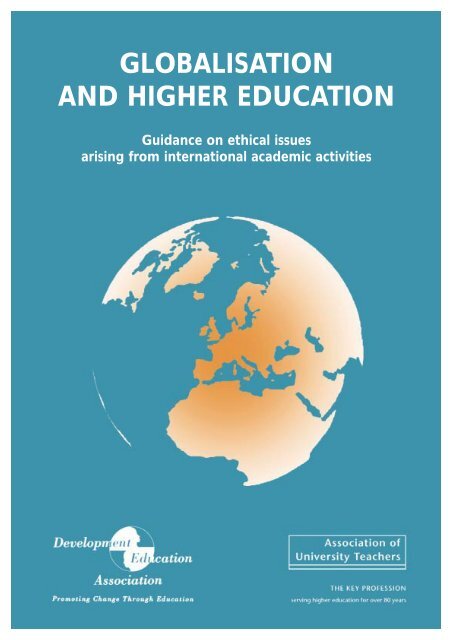
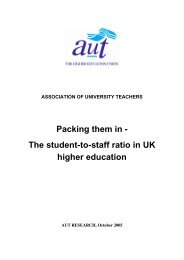
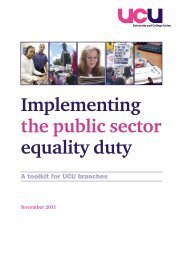
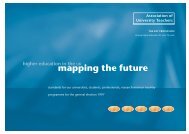
![(.pdf) [29kb] - UCU](https://img.yumpu.com/50914942/1/184x260/pdf-29kb-ucu.jpg?quality=85)
